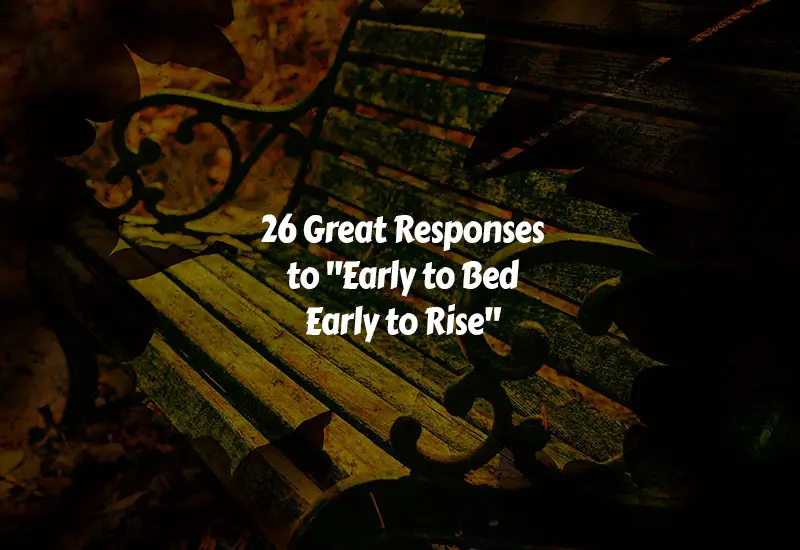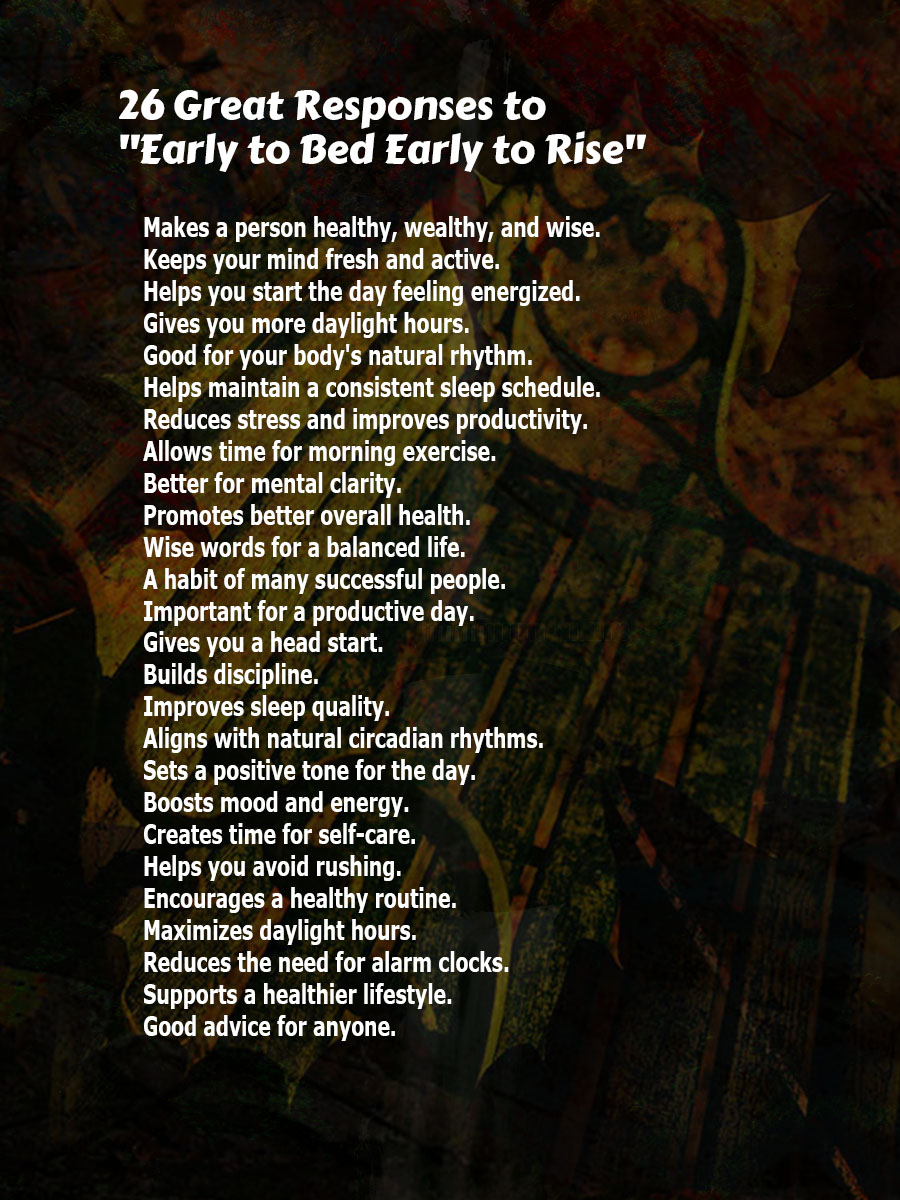Have you ever heard the saying ‘Early to bed, early to rise’? It means going to sleep and waking up early. But does it really work? In this article, we’ll explore 26 great responses to this idea. Whether you’re a night owl or an early bird, there’s something here for everyone.
From health benefits to productivity tips, we’ll uncover why some people swear by early mornings and others prefer burning the midnight oil. Get ready to discover how different people approach this age-old advice and find out what might work best for you!

Here are 26 Great Responses to “Early to Bed Early to Rise”:
- Makes a person healthy, wealthy, and wise.
- Keeps your mind fresh and active.
- Helps you start the day feeling energized.
- Gives you more daylight hours.
- Good for your body’s natural rhythm.
- Helps maintain a consistent sleep schedule.
- Reduces stress and improves productivity.
- Allows time for morning exercise.
- Better for mental clarity.
- Promotes better overall health.
- Wise words for a balanced life.
- A habit of many successful people.
- Important for a productive day.
- Gives you a head start.
- Builds discipline.
- Improves sleep quality.
- Aligns with natural circadian rhythms.
- Sets a positive tone for the day.
- Boosts mood and energy.
- Creates time for self-care.
- Helps you avoid rushing.
- Encourages a healthy routine.
- Maximizes daylight hours.
- Reduces the need for alarm clocks.
- Supports a healthier lifestyle.
- Good advice for anyone.
Benefits Of Early Rising
Early rising offers numerous benefits that contribute to a healthier and more productive lifestyle.
Increased Productivity
Early rising allows you to start your day refreshed, leading to enhanced focus and efficiency.
Improved Mental Health
Waking up early provides time for self-care, which can boost mental well-being and reduce stress levels.
Challenges Faced By Night Owls
When it comes to the age-old saying “early to bed, early to rise,” many people find it to be easier said than done.
For night owls, the transition to a new routine can be particularly challenging.
From adapting to a different schedule to dealing with fatigue, there are several obstacles that night owls often face when trying to embrace a more morning-oriented lifestyle.
Adapting to New Routine
Changing from a late-night routine to an early morning one can be a significant adjustment for night owls. To adapt, it’s important to gradually shift bedtime and waking times earlier by about 15-30 minutes each day. Creating a relaxing bedtime routine and sticking to a consistent sleep schedule can also help the transition.
Dealing With Fatigue
As night owls make the shift to become early risers, it’s common to experience periods of fatigue and grogginess. To combat this, it’s crucial to prioritize healthy habits such as maintaining a balanced diet, staying hydrated, and engaging in regular exercise. Additionally, ensuring the sleep environment is conducive to quality rest can aid in minimizing fatigue.
Alternative Schedules
Explore different scheduling options to accommodate your natural rhythm, from flexible work hours to productive night shifts. Embrace individual preferences for peak performance and work-life balance.
In today’s fast-paced world, the idea of “early to bed, early to rise” might not be feasible or suitable for everyone. Alternative schedules offer a range of options for individuals who thrive at different hours of the day.
Whether you’re a night owl, have irregular working hours, or simply prefer a different sleep pattern, here are some alternative schedules that may better align with your lifestyle.
Flexible Work Hours
Flexible work hours have gained popularity in recent years, giving employees the freedom to choose when they start and finish their workday. This schedule allows individuals to tailor their sleep patterns according to their natural rhythm, boosting productivity and overall job satisfaction.
By providing the ability to adjust working hours, companies embrace the diverse needs of their employees, recognizing that not everyone functions optimally during the traditional 9-to-5 shift. Flexible work hours enable individuals to take advantage of their most productive moments, whether it’s early in the morning, late in the evening, or even during the night.
Segmented Sleep Patterns
Segmented sleep patterns involve breaking up sleep into multiple shorter periods throughout the day or night. This alternative schedule may be suitable for those who experience difficulty sleeping for the recommended continuous 7-8 hours.
Some individuals find that dividing their sleep into two separate blocks, such as a long nap during the day and a shorter sleep period at night, allows them to feel more refreshed and alert. Segmenting sleep can also accommodate those with other commitments or responsibilities during the night, such as caregiving or personal projects.
It’s important to note that adjusting to a segmented sleep pattern may require experimentation and consultation with healthcare professionals. Creating a consistent routine and ensuring a conducive sleep environment can help maximize the benefits of this alternative schedule.
Alternative schedules provide individuals with the opportunity to optimize their sleep patterns and work according to their body’s natural rhythm. Whether it’s flexible work hours or segmented sleep patterns, embracing these alternatives can lead to improved well-being, enhanced productivity, and a better work-life balance.
Healthy Habits For Better Sleep
Establishing A Nighttime Routine
A well-designed nighttime routine can help signal your body that it’s time to wind down and prepare for sleep. Consider incorporating the following habits into your nighttime routine:
- Set a consistent bedtime and wake-up time – maintaining a regular sleep schedule helps regulate your body’s internal clock.
- Avoid electronic screens in the hour leading up to bedtime – the blue light emitted from screens can disrupt your sleep-wake cycle.
- Engage in relaxing activities such as reading a book, taking a warm bath, or practicing meditation to promote relaxation.
- Avoid consuming caffeine and stimulating substances close to bedtime as they can interfere with your ability to fall asleep.
- Create a calming environment in your bedroom, free from distractions and noise.
Creating A Sleep-friendly Environment
Ensuring your bedroom is designed to promote restful sleep is essential. Consider the following tips to create a sleep-friendly environment:
- Use blackout curtains or shades to block out external light that can disrupt your sleep.
- Invest in a comfortable mattress and pillows that suit your sleeping preferences.
- Maintain a cool temperature in your bedroom as a cooler environment often aids in falling and staying asleep.
- Reduce noise disturbances by using earplugs or a white noise machine if necessary.
| Tip | Description |
|---|---|
| Avoid bright lighting | Use dim or soft lighting in the evening to help prepare your body for sleep. |
| Keep your bedroom clean and clutter-free | A tidy space promotes relaxation and reduces potential distractions. |
| Limit pets in the bedroom | While furry friends bring comfort, they can disrupt sleep with their movements and sounds. |
By incorporating these healthy habits into your bedtime routine and optimizing your sleep environment, you can increase the likelihood of experiencing a restful and rejuvenating night’s sleep. Remember, consistency and creating a peaceful atmosphere are key to attaining a good night’s rest.

More Additional Responses
- Enhances focus and concentration.
- Facilitates better time management.
- Supports a regular eating schedule.
- Reduces the temptation to oversleep.
- Allows for peaceful morning routines.
- Helps in enjoying quiet early hours.
- Enables early bird activities.
- Contributes to a happier mindset.
- Provides quiet time for reflection.
- Enhances mindfulness practices.
- Boosts creativity in the morning.
- Aligns with natural waking cues.
- Helps maintain a consistent routine.
- Sets a positive example for others.
- Promotes healthier relationships.
- Facilitates deeper sleep cycles.
- Gives more time for breakfast.
- Minimizes exposure to late-night distractions.
- Prepares you for a successful day.
- Aligns with the sunrise for natural light exposure.
I hope these great responses to ‘Early to Bed Early to Rise’ help you understand different views. It’s important to respect everyone’s choices. Some like rising early, others prefer staying up late. Whatever you choose, what matters is feeling good and being productive. So, find what works best for you and enjoy your sleep!”









